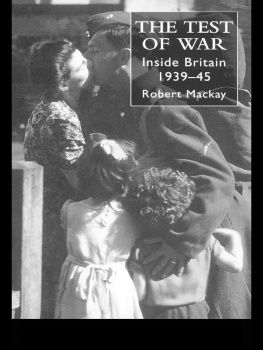Robert Mackay, 1999
This book is copyright under the Berne Convention.
No reproduction without permission.
All rights reserved.
Published in the UK in 1999 by UCL Press
UCL Press Limited
Taylor & Francis Group
1 Gunpowder Square
London EC4A 3DF
and
325 Chestnut Street
8th Floor
Philadelphia
PA 19106
USA
This edition published in the Taylor & Francis e-Library, 2003.
The name of University College London (UCL) is a registered trade mark used by UCL Press with the consent of the owner.
ISBN 0-203-21471-4 Master e-book ISBN
ISBN 0-203-27120-3 (Adobe eReader Format)
ISBNs: 1-85728-634-0 HB
1-85728-635-9 PB
British Cataloguing-in-Publication Data
A catalogue record for this book is available from the British Library.
Every effort has been made to contact copyright holders for their permission to reprint material in this book. The publishers would be grateful to hear from any copyright holder who is not here acknowledged and will undertake to rectify any errors or omissions in future editions of this book.
Preface
For all participant states in the Second World War the domestic experience of the war reflected the way in which the conflict widened and intensified. Two separate wars, in Poland and China, spread and ultimately joined in a war embracing the greater part of the globe. The corresponding escalation in the activity of armed forces brought about the mobilization of all possible human and material resources. While it lasted, the war dominated the life of the nations that were involved and most of those that were not. Since Britain was in at both the start and the finish, her people experienced the impact of total war in full measure. The experience was a test of the most comprehensive kind: of the institutions, of the resources, of the very cohesion of the nation. How the nation responded to the test of war is the subject of this book.
Since any book about the Second World War is by definition potentially global in reach, the sub-title of this book is intended to indicate its confinement to the home front in Britain. During the course of the war Britains armed forces were in action in several continents and oceans but that story in not told here. Reference is made to the changing external context only in so far as this affected government policies and thereby, directly or indirectly, domestic institutions and the daily lives of the people.
My approach has been thematic rather than chronological. I have therefore sought to compensate for the consequent loss of a sense of the passage of time and sequence of events by including in the first chapter a brief overview of the six years Britain was at war.
This book is not primarily concerned with social change and the role of the war in that process; for that, a different focus and a longer perspective would be needed. But I have attempted, in the second and tenth chapters, to record the condition of Britain before and after its ordeal by war.
Books of broad compass like this one necessarily depend on the work of many authors. I acknowledge my debt to them and append a bibliography that (I hope) names them all. I would also like to thank the Faculty of Humanities at The Nottingham Trent University for the time that got the project started and the support that got it finished.
Robert Mackay
1998
Chapter One
Going to war
It is a paradox that when Britain went to war in September 1939, it was, as in 1914, a result of her own ultimatum. For not only was the issue that prompted it on the other side of Europe, where Britain had few interests, but Britain was in a state of military unreadiness, pacifist sentiment was strong, and the government was in the hands of men determined to prevent the country from being drawn into other peoples conflicts. Never again was the feeling at all levels of society in 1918; and yet, here again, when the memories of that time were scarcely faded, the call to total war went out.
In retrospect, the Second World War and Britains participation in it has an air of inevitability. But creeping fatalism about another war did not properly begin in Britain until 19356. For a decade before then, foreign troubles seemed remote and unlikely to involve Britain directly. On the whole, international politics seemed less threatening than in the early years after the First World War. The League of Nations, established in 1919 to preserve peace through collective security, was steadily increasing its membership and was enhancing its credentials through its role in the settlement of international disputes. FrancoGerman antagonism, which in the past had been a chief source of instability and conflict, seemed to be giving way to reconciliation: at Locarno in 1925 France and Germany signed agreements that guaranteed the common frontiers of France, Germany and Belgium and committed them to seek arbitration in their disputes. At the same time Germany joined the League of Nations, thereby pledging herself to playing her part in disarmament and the peaceful solution of international problems.
Ten years on the optimists were on the defensive. The whole international atmosphere had deteriorated with the onset of the Great Depression and the resort by states to selfish measures of protection for their economies. This, in turn, had stimulated the rise of political parties advocating extreme solutions to the acute economic problems that democratic governments had failed to solve. In Germany the result was the accession to power of Adolf Hitlers National Socialist Party, followed by walk-out from the League of Nations and, in defiance of the restrictions placed on Germany in the 1919 Versailles Treaty, rearmament and the restoration of military conscription. With a more pugnacious and assertive government in Germany, the departure of Italy from the group of peaceful states was the more worrying. For although Benito Mussolinis rule was an undisguisedly brutal dictatorship, in international affairs Italy seemed not entirely lost to reasonableness and responsibility. In 1935, however, Mussolini shattered this conception when he initiated a war of conquest against a fellow member of the League, Abyssinia. The Leagues condemnation of Italy had the disastrous consequences of propelling her into a closer relationship with Germany while failing to save Abyssinia and thereby signalling the ineffectiveness of the League in the face of determined aggression by delinquent states. The prospects for an enduring peace looked poorer.
It had been the premise of Britains defence thinking since 1933 that her most likely enemy in Europe was Germany. This presumption was based more on calculations about Germanys potential industrial and military strength than on a consideration of Britains interests vis-vis those of Germany. Yet, at all levels of society, British attitudes towards Germany and the Germans were generally more favourable than towards France and the French, a situation that changed only in the final year of peace. Partly because of J.M. Keyness telling criticisms of the victors treatment of Germany at the Paris peace conference in 1919 (The economic consequences of the peace), it became generally accepted in the 1920s that Germany had been judged too harshly, that she had legitimate grievances about the details of the terms imposed on her, and that Frances attitude to her was punitive and unreasonable. When France responded to Germanys defaulting on reparation payments in 1923 by sending troops into the Ruhr to exact the payments, Britain failed to give France diplomatic support, taking instead an even-handed line that infuriated the French, but which probably represented popular opinion on the matter in Britain. The coming to power of Hitler and the Nazis hardly affected British sentiments towards Germany. If anything, to a general sympathy for German grievances there was now added, at least in the early years after 1933, an admiration for Hitlers success in reviving the German economy and restoring Germans self-esteem. To be sure, the rough handling of his domestic political opponents was distasteful, and the racial policies were scarcely comprehensible in a modern state, but these were essentially internal matters that should not be allowed to sour relations with Britain. If a sense of fair play disposed most British people to be open-minded about the new Germany, there were special qualities in Hitler that made some rather less impartial. Hitler was outspokenly committed to fighting and destroying Communism. Ever since the Russian Revolution in 1917 and the setting up of the first communist state, conservative elements everywhere reserved their greatest fears for the Bolshevik bacillus that threatened to infect the body politic of every capitalist state. Hitlers unequalled credentials as the enemy of International Communism outweighed any faults he might have had and made his friendship a matter of basic self-interest for capitalist states. Henry Chips Channon MP put it this way: we should let gallant little Germany glut her fill of the Reds in the East and keep decadent France quiet while she does so. Enthusiasts for Hitler existed in France, too, but there the ideological aspect was confused by the countrys historically adversarial relationship with Germany. In Britain, people could feel good about Hitler without hearing at the same time the nagging voice of patriotic conscience. Sympathy and admiration for Germany was often coupled in conservative circles with a dislike of France. Paradoxically, for France was Britains one natural ally, irritation at her obdurate attachment to the letter of the Versailles Treaty was, in the mid-1930s, joined by feelings of distrust as first she made a pact with the USSR in 1935 and then came under the control of the leftwing Popular Front Government in 1936.











